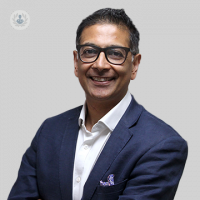Bowel cancer: when it is better not to have surgery?
Escrito por:Deciding whether or not to have an operation for cancer is a very difficult dilemma. Do we always get it right? Consultant surgeon Mr Tan Arulampalam argues that patients need better information about the consequences of all the treatment options available including not operating in certain circumstances. Frail patients in particular should consider whether they can have a better quality of life without radical cancer surgery. This approach may be universal but the specifics of treatment have to be tailored to the individual.

Cancer is often viewed as a battle. As a society we have great respect for anyone who has “fought” cancer and gone through gruelling treatments with the aim of stopping it in its tracks.
It is absolutely natural for us to want to do anything that could increase ours or our relative’s chances of survival. This largely makes sense in those patients where we can often see a dramatic difference in lifespan as a result of effective cancer treatment.
But what most people don’t understand is how different the picture can be for frail and elderly patients – by which I mean patients who are often over the age of 80. At this age, patients are much less likely to die from their cancer, and the risks from surgery are much higher. The decision to operate and the nature of the operation is therefore much more complicated.
A case in point: bowel cancer surgery
Let us take a look at the example of bowel cancer. Surgery is one of the most important strategies in curing bowel cancer. In the UK we only advise against surgery when the patient is too frail to have the procedure. In these cases the treatment is worse than the disease.
Bowel surgery is inherently risky. For elderly patients the 30-day mortality rate may be up to 13-15%, and it could be as high as 25% after 90 days.
For those frail patients who come through their surgery there may be significant challenges recovering normal (pre-operative) function, for example mobility or the ability to carry out activities of daily living, without a dramatic increase in lifespan. My team have looked at this juxtaposition in a recent study which reviewed those patients who did not undergo surgery for bowel cancer. These patients had an average life expectancy of approximately 1 ½ years from diagnosis. Only 30% died as a result of bowel cancer – the vast majority died of other causes. In comparison, a healthy person at the same age can expect to live 3 ½ years. In other words: having a diagnosis of cancer will have made a marginal difference to their overall survival.
Taking quality of life into account
When the difference in life expectancy reduces, and I accept that this is a subjective matter, it is worth considering whether quality of life is just as, if not more important.
In the case of bowel cancer surgery we know that around 10% of elderly patients may not return to their previous accommodation after surgery, and some may need residential care support. In addition to this, approximately 70% find that their ability to carry out day-to-day tasks never fully recovers after surgery.
This of course has to be balanced against the symptoms of bowel cancer if left untreated. In the group we studied, tumours in the colon remained largely asymptomatic, whereas in contrast patients with rectal cancer had ongoing symptoms that significantly affected their lives.
Still, it is fair to say many patients may well experience a much better quality of life without surgery.
So should we treat elderly patients differently?
None of this is to suggest we should be “ageist” in our decision-making. Instead it is about assessing frailty, which is best thought of as a decreased resistance to stress and disease. The more frail the patient, the higher the rate of morbidity and complications from surgery. Even though it is a factor, your age alone is not enough to predict your resistance to disease and overall survival. Two people with the same chronological age may have a very different biological age.
So, as with all medicine, the decision comes down to the individual patient. For some patients, the choice to have surgery will not be primarily about lifespan – it will be about how to live the rest of their life in the best possible way. Proper information with shared decision-making and discussion are, therefore, mandatory.
To book a consultation with Mr Arulampalam, click here.


